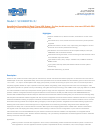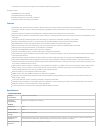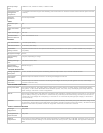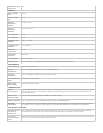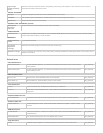
EMI / RFI AC noise
suppression
Yes
PHYSICAL
Shipping weight
(lbs)
112.44
Shipping weight
(kg)
55.53
Shipping
Dimensions
(HWD/in)
11.25 x 23 x 31.5
Shipping
Dimensions
(HWD/cm)
28.5 x 58.4 x 79.3
Unit weight (lbs) 73.85
Unit weight (kg) 33.49
Unit Dimensions
(HWD/in)
5.25 x 17.75 x 26
Unit Dimensions
(HWD/cm)
13.3 x 45 x 66
Material of
construction
Steel
Form factors
supported
Rack (3U)
Cooling method Built-in cooling fan
Battery Access User replaceable, hot-swappable battery replacement supported via front access panel
ENVIRONMENTAL
Relative Humidity 0 to 95%, non-condensing
Storage
Temperature
+5 to +122 degrees Fahrenheit / -15 to +50 degrees Celsius
Operating
Temperature
32 to +104 degrees Fahrenheit / 0 to +40 degrees Celsius
Line mode BTU/hr.
(Max.)
1219.3 BTU/hr. (worst case)
Battery mode
BTU/hr. (Max.)
1328.4 BTU/hr. (worst case)
COMMUNICATIONS
Network
monitoring port
Includes USB and DB9 serial ports. Built-in DB9 port offers both enhanced RS-232 enabled monitoring data, plus contact
closure monitoring ability. HID-compliant USB interface enables integration with built-in power management and auto
shutdown features of
Software and
cabling included
Yes, includes PowerAlert software CD-ROM and complete cabling
SNMP compatibility Yes, includes slot for optional SNMPWEBCARD accessory (#SNMPWEBCARD)
WatchDog
compatibility
Yes, compatible with Tripp Lite's Watchdog system service to restore operation to locked equipment through soft reboot
of application / OS or hard power off/on reboot of connected equipmentâ"ideal for unattended kiosk applications
LINE / BATTERY TRANSFER
Transfer time from
line power to
battery mode
Zero, online UPS continuously converts incoming AC to DC, then back to AC. When commercial power is interrupted,
UPS maintains continuous output from battery reserves with absolutely no disruption in output AC power.
Low voltage
transfer to battery
power
Maintains continuous operation during undervoltages as low as 65V (80V at load levels over 70%). Below this switchover
point, output is supported from battery derived AC power.



